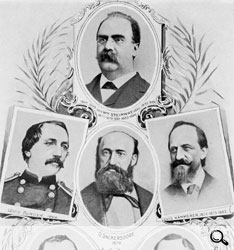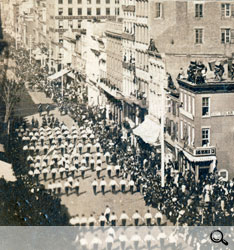

“The various processions of the Germans move to their allotted places…. I [march] with the L.K. down Bowery, Chatham street across City Hall Park, where the Governor and Mayor view the parade, up Broadway around Union Square, past Steinway Hall…. Everything passes off in excellent style….The affair today was the most imposing of its kind that ever took place in America.” —April 10, 1871, Diary Volume Three
German American Patriot
Like so many of his time, William was part of two cultures and his loyalty to each was one of his most marked characteristics. His love of German culture and music permeates the Diary. It is noteworthy that his first and last entries describe his participation in the New York Liederkranz, the German singing society in which he spent countless hours singing tenor and enjoying German fellowship. As Liederkranz president, William oversaw the construction of a grand club house that signaled Germans’ social arrival in America. His diary notes hundreds of events that reflected this rise, including his 1871 description of 100,000 German Americans parading before New York dignitaries to celebrate the end of the Franco- Prussian War. Over time, widespread respect for German musical traditions allowed William and others entrée into previously closed circles of power. This success enabled William to become a benefactor to both the city of his birth and his adopted city of New York.
Past Presidents of the Liederkranz, 1867–1883, William Steinway (top)
From History of the Liederkranz of the City of New York, 1947
New York City Grand Procession, April 10, 1871, in commemoration of the Treaty of Peace between Germany and France (stereoscope detail published by E. & H. T. Anthony)
Robert N. Dennis Collection of Stereoscopic Views, Miriam and Ira D. Wallach Division of Art, Prints and Photographs
Courtesy of The New York Public Library, Astor, Lenox and Tilden Foundations

